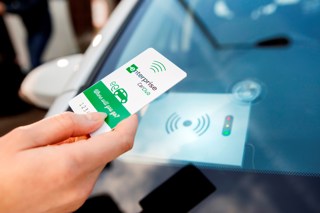Leicester City Council is considering introducing a workplace parking levy where employers would be charged for providing parking spaces for their employees.
The local authority says the measure could be introduced to help fund local transport improvements while helping cut congestion and traffic pollution.
To date, Nottingham is the only UK city to have introduced a workplace parking levy. This has been in operation since 2012 and has brought in over £60million, which the council has invested in public transport including tram, bus and railway station improvements.
Other local authorities – including Birmingham, Oxford, Reading, Edinburgh, and several London boroughs – are investigating the introduction of similar schemes, says the city council.
Earlier this year, the AA reported that Hounslow Council was proposing to introduce a charge between £500 and £1,000 and nine other councils were considering similar measures.
Deputy city mayor Cllr Adam Clarke, who leads on environment and transportation, said: “Like many cities, Leicester faces real challenges to improve air quality, cut congestion and encourage more people to make the shift to sustainable, clean transport options.
“It is essential that we continue to invest in transport improvements that encourage more people to walk, cycle and take the bus.”
Leicester City Council is developing a new Local Transport Plan setting out the future transport vision for the city and how this could be funded, including potentially through a workplace parking levy.
Initial consultation on this plan will be followed by a statutory public consultation on the workplace parking levy. This is likely to take around 18 months to two years.
“There is a lot of work that needs to be done before we can consult on our case for a workplace parking levy, including developing a new local transport plan that reflects the opportunities that this new funding would allow us to explore,” explained Clarke.
“While that work is ongoing, we will be approaching businesses and other relevant organisations and aiming to start a discussion around the city’s transport challenges and how we can fund future improvements. We’re at a very early stage of a lengthy process.”
Clarke and the city’s mayor Peter Soulsby are planning to host a Twitter question and answer session on Tuesday, September 10.
Soulsby said: “While we have been extremely successful in attracting major funding from Government and other sources, a workplace parking levy would provide a reliable and ongoing source of locally-controlled funding to help us commit to ambitious, long-term transport improvements.
“These could for example include the electrification of the city’s bus fleet, a more comprehensive network of bus and cycle routes across the city, improvements to major transport hubs like the railway station and more work to reduce traffic pollution in the city.
“No decisions have been made yet, but we do want to consult on the idea of the workplace parking levy as a means of a funding future transport improvements.”
The process for introducing a workplace parking levy is set out in the Transport Act 2000. Any proposed scheme will be subject to approval from the Secretary of State for Transport.
All income raised from a workplace parking scheme in Leicester could only be spent on transport schemes included in the Local Transport Plan. The city’s renewed transport plan is due to be consulted on in early 2020.
It is likely that a formal consultation on a workplace levy will take place in early 2021.
Plans to consult on the introduction a workplace parking levy are due to be discussed at the next meeting of the council’s Economic development, Transport and Tourism scrutiny committee tomorrow (Thursday, August 22).
To find out more about how a workplace parking levy might work, the process for implementation and the forthcoming consultation, visit www.leicester.gov.uk/WorkplaceParkingLevy.























John Henry - 21/08/2019 16:11
Workplace Parking Levy Having just read your article about the introduction of Workplace Parking Levies or to put into other words " Introduction of another Tax on the motorist", who requires this means of transport to carry out his employment duties. The essential user is always at the brunt of these money raising tactics. BiK already taxes the user at extortionate levels ( what benefit is there is driving 30,000 miles per annum on business and 5000 personal miles and having to pay the same tax as the perk user doing 5000 business miles. Then the uplift in First Registration Fees and Annual Road Tax which appear to be based on holding a finger in the air and seeing what way the wind blows. As Company Car Users decrease so will the BiK decrease and when a Parking Levies are introduced Companies will look to relocate out of city areas thereby local traders will miss the footfall which is already on the decline. Large Supermarkets have free parking or at a period of use charge so will they be liable for this levy as they require this system to enable their business to function, just the same as any other business require their mobile staff to attend their office of employment. Why always the motorist ? No cars, No employment, No taxes.!!!!! Enough is enough..